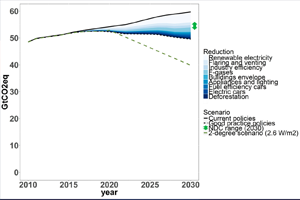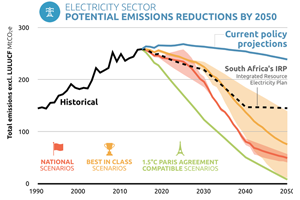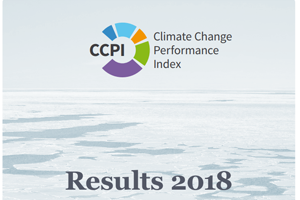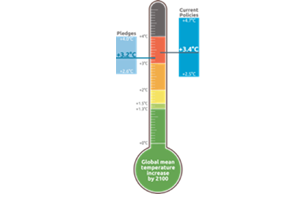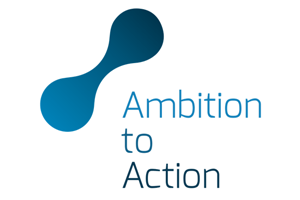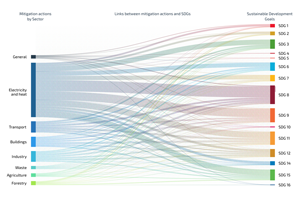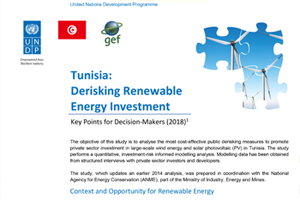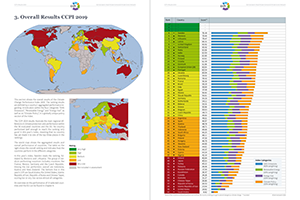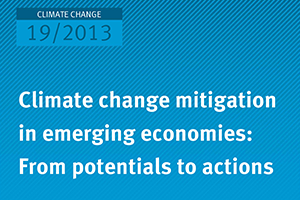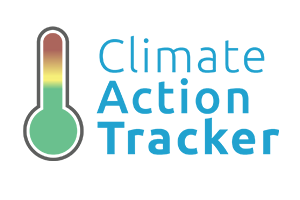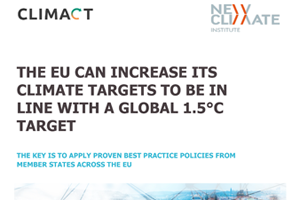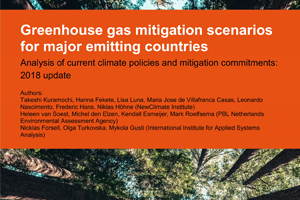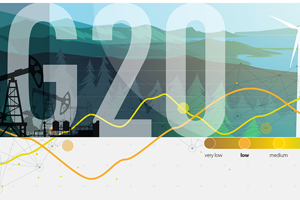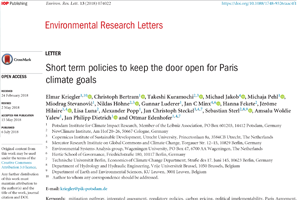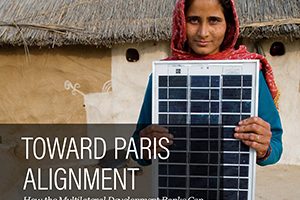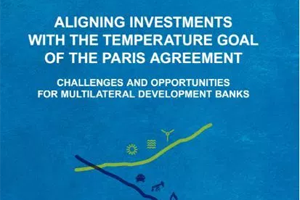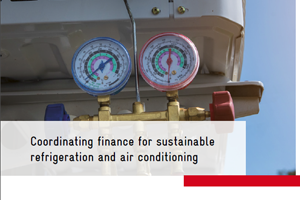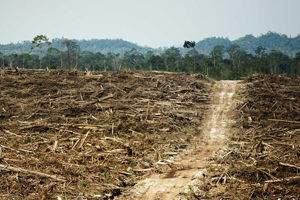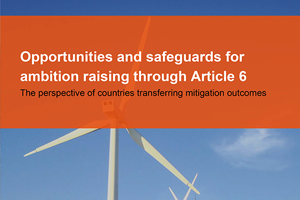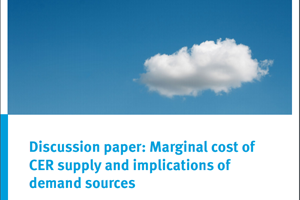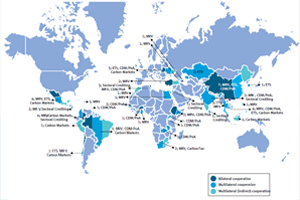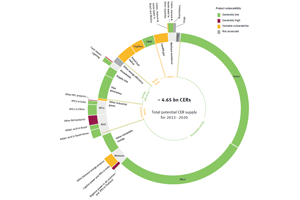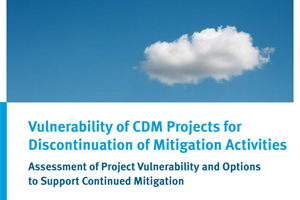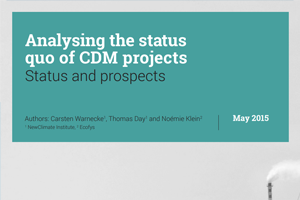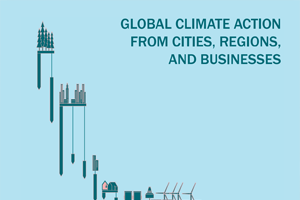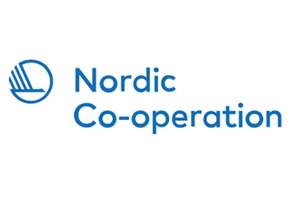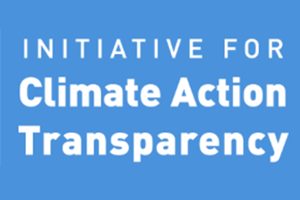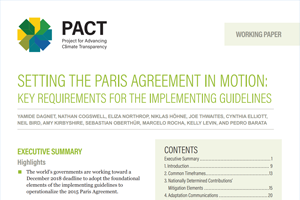 From December 2-14 2018, the 24th Conference of Parties of the UNFCCC took place. NewClimate Institute was present at Katowice with multiple events. Also, we already had released several related publications beforehand, and continued doing so during the COP itself. Find all information about it here.
From December 2-14 2018, the 24th Conference of Parties of the UNFCCC took place. NewClimate Institute was present at Katowice with multiple events. Also, we already had released several related publications beforehand, and continued doing so during the COP itself. Find all information about it here.
Events & Appearances
Events with NewClimate Institute participation:
Side event: Increasing mitigation action for 1.5°C (NewClimate-Event) NewClimate Institute and Wuppertal Institute presented an analysis on short-term steps to reduce emissions.
Organiser: CAN Europe, NewClimate Institute
Speakers: Lisa Luna (NewClimate), Hanna Wang-Helmreich (Wuppertal Institute), Kakhaberi Mdiviani (Ministry of Environment and Agriculture of Georgia)
Side event: UNEP Gap Report Authors of the UNEP emissions gap report presented findings on the emissions gap and ways to narrow it.
Organiser: UNEP
Speakers: Authors of the UNEP Emissions Gap report, incl. Niklas Höhne (NewClimate)
Side event: Making climate action more transparent and ambitious Lessons learned from the first round of NDCs. Organiser: DIE, IVM, Yale Speakers: Pieter Pauw (DIE), Angel Hsu (Yale), Oscar Widerberg (IVM), Paula Castro (UZH), Mizan Khan (North South University), Niklas Höhne (NewClimate Institute) and others
Tuesday 4 December 15h00 - 16h30 Room Wisla
Side event: Transitioning to a new era of flexible mechanisms for increased ambition Lessons which should be drawn for the design of future markets. Organiser: Carbon Market Watch & Indigenous Environmental Network Speakers: various, including Carsten Warnecke (NewClimate) Event Agenda & Registration
Tuesday 4 December 16h45 - 18h15 Room Warmia
Side event: The Emissions Gap and the Brown to Green report - How do we enhance ambition and accelerate action? This side event featured presentations of the key findings of the two reports, followed by an interactive discussion between panelists and the audience. Organiser: UNEP DTU Partnership, Climate Transparency Speakers: various, including Niklas Höhne and Takeshi Kuramochi (both NewClimate)
Tuesday 4 December 17h00 - 18h30 EU Pavilion
Side event: Leading the way on enhanced ambition Policy opportunities in China and Europe at the sector level. Organiser: ClimateWorks Foundation Speakers: various, including Frederic Hans (NewClimate) Accompanying documents
Tuesday 4 December 18h30 - 20h00 EU Pavilion
Room Brussels
Side event: The future role of the Adaptation Fund (AF) in the international climate finance architecture Organiser: Germanwatch Speakers: various, including Carsten Warnecke (NewClimate) Accompanying documents
Wednesday 5 December 12h00 - 13h30 German Pavilion
Side event: From the skies or the sea: How can regulation align international transport with the Paris goals? (NewClimate-Event) This side-event presented the ongoing policy negotiations to regulate emissions from international aviation and shipping in ICAO and the IMO and asked whether the current approaches are aligned with achieving the temperature goals of the Paris Agreement. Organiser: NewClimate Institute, T&E Speakers: various, incl. Harry Fearnehough, Aki Kachi, Thomas Day (all NewClimate) Accompanying documents
Wednesday 5 December 13h30 - 15h30 EU Pavilion
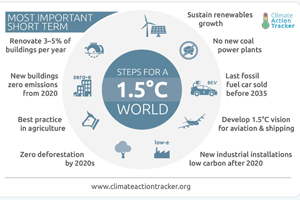 View webcast recording View presentation
View webcast recording View presentation
Side event: A new understanding of Paris-compatible climate action: Translating 1.5°C into technological, social, and political examples of transitional change around the world. (NewClimate-Event) How do we bring the Paris 1.5°C goal to life? Experts, practitioners and decision-makers will present and discuss Paris-compatible climate action happening today with examples from economic sectors, policies, businesses, law and people. Organiser: Greenpeace, NewClimate Institute Speakers: Juan Pablo Osornio (Greenpeace), Niklas Höhne, Hanna Fekete (both NewClimate), Heidi Finskas (KLP), Happy Khambule (Greenpeace)
Wednesday 5 December 15h00 - 16h30 Room Warmia
Press conference: How can the EU raise its climate ambition? Climate Action tracker press conference. Climate Action Tracker
Thursday 6 December 10h00 - 10h30 Press conference room
Side event: How possible are “system transitions” consistent with global warming of 1.5? Organiser: IGES and Wuppertal Institut Speakers: various, including Hanna Fekete (NewClimate)
Thursday 6 December 13h00 - 14h30 Japan Pavilion
Side event: Energy Transition in Turkey Organiser: Istanbul Policy Center and SHURA Speakers: various, including Takeshi Kuramochi (NewClimate)
Thursday 6 December 15h30 - 17h30 Turkey Pavilion
Side event: How can South Africa move toward a 1.5°C pathway? Organiser: Climate Action Tracker Speakers: various, including Hanna Fekete, Niklas Höhne and Frederic Hans (all NewClimate)
Thursday 6 December 16h00 - 16h45 South Africa Pavilion
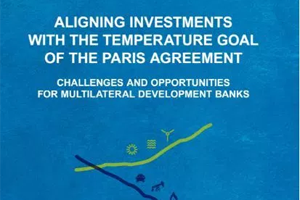
Side event: Aligning Investments with the Temperature Goal of the Paris Agreement (NewClimate-Event) Experts discussed how Multilateral Development Banks can support the global temperature goal of the Paris Agreement, and how the banks could strengthen existing tools to align their portfolios and activities with the globally agreed mitigation goal. Organiser: BMZ, Germanwatch, WRI, NewClimate Institute Speakers: various, including Hanna Fekete (NewClimate) Accompanying documents
Thursday 6 December 17h30 - 19h00 German Pavilion
Side event: Briefing “Climate Finance – Next steps to foster climate action” A conversation on the future outlook for climate finance with representative from the financial sector, civil society and science. Organiser: ICC Speakers: various, including Aki Kachi (NewClimate)
Friday 7 December 10h00 - 11h30 German Pavilion
Side event: Driving NDC Implementation How can global initiatives for NDC implementation and finance foster sustainable and ambitious NDC progress? Organiser: BMU Speakers: various, including Norber Gorissen (BMU) and Niklas Höhne (NewClimate)
Friday 7 December 12h00 - 13h30 German Pavilion

Side event: NDC Update Report 2018 (NewClimate-Event) Launch of the latest edition of the NDC Update Report which discusses progress of NDC implementation with a special focus on Ambition. Organiser: ECN Speakers: various, including Thomas Day (NewClimate) A2A project page
Friday 7 December 15h00 - 16h30 Benelux Pavilion
Side event: Tracking progress on NDCs – Gaps and needs on national and regional policy and research strategy (NewClimate-Event) This side event presenedt research results, tools and initiatives aiming at monitoring, evaluating and implementing national NDCs both in Northern and the Southern countries. Organiser: IRD, PBL, Climate Action Tracker Speakers: various, including Takeshi Kuramochi and Niklas Höhne (both NewClimate) Climate Action Tracker Accompanying documents
Saturday 8 December 10h30 - 12h00 EU Pavilion
Side event: Raising ambition: What do the long-term mitigation goals of the Paris Agreement mean for countries and how can they be implemented? (NewClimate-Event) Experts and policy makers discussed case studies from Argentina and South Africa. Organiser: NewClimate Institute Speakers: various, including Frauke Röser and Niklas Höhne (both NewClimate)
Saturday 8 December 14h00 - 14h45 German Pavilion
Side event: Building partnerships and tracking progress – Role of non-state and subnational climate actors How do non-state actors perform and how can action be strengthened? Organiser: DIE Speakers: various, including Niklas Höhne (NewClimate)
Saturday 8 December 14h30 - 16h00 EU Pavilion
Press conference: Climate Change Performance index (CCPI) (NewClimate-Event) Release of the 2019 version of the Climate Change Performance Index. Organiser: Germanwatch, CAN, NewClimate Institute Speakers: various including Jan Burck (Germanwatch), Niklas Höhne (NewClimate) CCPI project page
Monday 10 December 10h30 - 11h00 Press conference room
Side event: Emerging Science of 1.5°C: Mitigation Pathways to Paris How to limit warming in line with the Paris Agreement? How can we achieve a just transition and climate neutrality across key economic sectors? Organiser: Bundesministerium für Bildung und Forschung Speakers: various, including Niklas Höhne (NewClimate)
Monday 10 December 14h00 - 14h45 German Pavilion
View presentation View webcast recording
Side event: Raising Ambition by Linking National with Non-Party Actions This event reviewed recent assessments of the impact of non-Party climate action in the US and globally, and discussed approaches to fuse assessment of non-Party action with raising ambition at the national level in advance of the SG’s 2019 summit and 2020 COP. Organiser: UMD Center for Global Sustainability Speakers: various, including Niklas Höhne (NewClimate)
Monday 10 December 15h00 - 16h30 Room Pieniny
Side event: Shifting the trillions: the role of finance and net GHG neutrality to tackle climate impacts The side event brought together representatives from banking, industry and civil society to discuss the important role of finance to advance the climate agenda and achieve the goals of the Paris Agreement. Organiser: ICC, BDI, Action Aid Speakers: various, moderation by Frauke Röser (NewClimate)
Monday 10 December 15h30 - 16h30 EU Pavilion
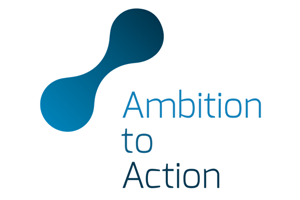
Evening reception: The role of co-benefits to drive climate action (NewClimate-Event) Discussing methods, tools and approaches to understand co-benefits of climate action to support the implementation of the Paris agenda. Organiser: NewClimate Institute, ECN Speakers: various, including Harry Fearnehough (NewClimate) A2A homepage
Monday 10 December 18h00 - 21h00 Restaurant “Stare i Nowe”
Chorzowska 7B
Katowice
Press conference: Climate Action Tracker temperature update (NewClimate-Event) Release of the up to date assessment of NDCs, their implementation and impact on global temperature. Organiser: Climate Action Tracker Speakers: Bill Hare (Climate Analytics), Yvonne Deng (Ecofys), Niklas Höhne (NewClimate) CAT homepage
Tuesday 11 December 11h30 - 12h00 Press conference room
Side event: 2018 UNEP Gap Report Presentation of the latest findings. Speakers: various authors of the report
Tuesday 11 December 13h15 - 14h45 Room Pieniny
Side event: Mainstreaming Paris alignment in Multilateral Development Banks Discussion of the principles behind the emerging harmonized approach to aligning MDBs' investments with the Paris Agreement. Speakers: various, including Aki Kachi (NewClimate)
Tuesday 11 December 16h10 - 17h05 WWF Pavilion
Side event: Article 6 pilots and ambition raising – Opportunities and safeguards (NewClimate-Event) Voluntary cooperation between Parties has the potential to increase ambition as needed for the long-term temperature goal. Article 6 activities should be carefully selected, designed and implemented to safeguard against potential risks that can create conditions for ambition disincentives. This side event discussed ambition in carbon markets including possible pilots. Organiser: NewClimate Institute Speakers: Franke Wolke (German Emissions Trading Authority DEHST); Aki Kachi (NewClimate Institute); Jakob Graichen (Öko-Institut); Felipe de Leon (Costa Rica); Laurence Mortier (Switzerland, invited); Gilles Dufrasne (Carbon Market Watch); Marion Verles (Gold Standard); Kentaro Takahashi (Japan, invited)
Wednesday 12 December 15h30 - 17h00 IETA Pavilion
Side event: What a low-carbon world really looks like in the next decades Modelling tools used and required for long-term planning. Organiser: PBL, IIASA, UBA Speakers: various, including Markus Hagemann (NewClimate)
Thursday 13 December 14h30 - 16h00 EU Pavilion
Related Publications
Publications related to the COP24:
Find all NewClimate's publications here
Climate and development:
Ambition to Action Project NewClimate Institute in partnership with the Energy Research Centre of the Netherlands (ECN) is supporting Argentina, Indonesia, Kenya and Thailand with the implementation of their Nationally Determined Contributions (NDCs), funded by the International Climate Initiative of the German government. Economic Impact Model (EIM): The model can be used to quantify employment and economic impacts of enhanced renewable energy scenarios and is being applied in various country contexts. Air pollution and health impacts: The model allows for the quantification of health impacts of fossil fuel based power plants (coal and gas). In future this will also include health impacts from transport activities. Energy Transition in Argentina: Working with government and non-government stakeholders to advance the dialogue on energy transition focusing on grid integration impacts of scaled up variable renewables. Energy pathways in Kenya: In cooperation with government stakeholders, alternative electricity sector pathways are analysed for their feasibility and their economic, environmental and social impacts. www.ambitiontoaction.net
Capacity Development for Climate Policy in Georgia and Mongolia NewClimate Institute, as an implementing partner of GIZ, supports to Governments of Georgia and Mongolia with the further development of their climate policy planning. The support activities focus on the analysis of potential long-term decarbonisation pathways, support for the further integration of climate and sector-level planning processes, and planning for the implementation of the Nationally Determined Contributions. To the project page
SCAN (SDG & Climate Action Nexus) tool: Linking Climate Action and the Sustainable Development Goals The SCAN-tool provides high-level guidance on how mitigation actions can impact achievement of the Sustainable Development Goals (SDGs). It can support policy makers to achieve greater policy coherence and to improve the efficiency of implementation by providing them with an initial indication of which climate actions may impact -positively or negatively- specific SDG targets. To the tool
Climate Opportunity Report: More Jobs, Better Health, Liveable Cities The Climate Opportunity report investigates the economic, social and environmental benefits for climate change mitigation action in cities. Enhanced policies and measures for residential building retrofits, bus networks and district-scale renewable energy can generate millions of jobs, save billions of dollars for households, and prevent hundreds of thousands of deaths related to ambient air pollution worldwide. The analysis is based on the development of new methodologies, which provide local and national policymakers with a blueprint for how cities and nations can evaluate these impacts and benefits to develop their own robust cases for climate change mitigation policies. To the report
Tunisia: De-risking Renewable Energy Investment 2018 Developing countries often suffer from a high cost of capital. The competitiveness of utility-scale wind and solar projects is sensitive to changes in the cost of capital given high upfront investment needs. The study in cooperation with ALCOR and UNDP assesses the impact of risks on the financing costs for wind and solar projects in Tunisia and the effects of public policy instruments to lower the risks and increase the competitiveness of renewable technologies. To the report
NDC Update Report Special Edition: Linking NDCs and SDGs In this special edition of the NDC Update Report, we focus on the relationship between Nationally Determined Contributions (NDCs) and the Sustainable Development Goals (SDGs), and explore how climate and development actions can support each other. To the ten country report
Tracking countries' climate actions:
Climate Change Performance Index 2019 Developed by NewClimate Institute, Germanwatch and CAN, the index ties in with the global Climate Change Performance Index by Germanwatch, a rating of the 58 largest emitters of GHG emissions globally that has been published annually since 2006. To the project page
Implementation of future GHG mitigation goals: ten country reports on ambitious climate policy This report series by NewClimate Institute and Wuppertal Institute looks at existing climate policy frameworks and options for deeper emissions cuts in ten focus countries: Ethiopia, Georgia, Indonesia, Iran, Kenya, Colombia, Morocco, the Marshall Islands, Peru and Vietnam. To the reports
Climate Action Tracker The Climate Action Tracker evaluates whether 32 countries are on track to meet their climate commitments, annually estimates the global temperature increase based on implemented policies and pledges, and analyses options to strengthen mitigation action on a country and sector level. Climate Action Tracker homepage
Special report series:
Scaling Up Climate Action:This new report series considers options for countries to move their emissions towards a Paris Agreement compatible pathway and achieve significant benefits. The first report on South Africa covers actions for electricity production, urban passenger transport, and residential buildings. CAT Scaling up project page Decarbonisation Memo Series:This memo series provides guidance on how major emitting sectors can achieve the rapid transformations required to meet the Paris Agreement temperature goal. CAT Decarb Memos project page
The EU can increase its climate targets to be in line with a global 1.5°C target This project analyses best practice policies across Europe and how far extending them to all EU member states could support EU Greenhouse Gases (GHG) and energy targets. To the report
GHG mitigation scenarios for major emitting countries NewClimate Institute, PBL Netherlands Environmental Assessment Agency and IIASA provide an overview of climate and energy policies in 25 major emitting countries and regions and their impact on greenhouse gas (GHG) emissions projections in 2030. To the report
Brown to Green Report 2018 - The G20 transition to a low-carbon economy This report assesses how far the G20 countries have progressed in their transition from a “brown” economy based on fossil fuels to a “green” low-carbon and climate resilient economy. To the project page To the latest report
Short term policies to keep the door open for Paris climate goals This article shows how a strengthening of existing plans by a global roll-out of successful, regional sector policies can ease the implementation challenge of reaching the Paris climate goals. The novel element of it is to integrate such detailed policy packages until 2030 into pathways that reach long-term targets until 2100 using an integrated assessment modelling framework. The study is only a first step in connecting the analysis of mitigation pathways towards the Paris climate goals with an assessment of the implementability of near to medium term (2020–2050) climate action that would be consistent with these pathways. To the report (Update to be published early December 2018!)
Climate finance:
Aligning Investments with the Temperature Goal of the Paris Agreement This report describes a new Paradigm for Multilateral Development Banks to contribute to the fight against climate change, and provides recommendations on how the MDBs can transition from the current Climate Finance Paradigm to the new Paris Alignment Paradigm. To the report
Aligning Investments with the Temperature Goal of the Paris Agreement This working paper assesses how Multilateral Development Banks can support the global temperature goal of the Paris Agreement. It illustrates how the banks could strengthen existing tools to align their portfolios and activities with the globally agreed mitigation goal. Other finance institutions can also profit from many of the approaches included in the paper. To the report
Coordinating finance for sustainable refrigeration and air conditioning The refrigeration and air conditioning (RAC) sector faces a particular challenge in the implementation of effective finance strategies given its cross-sectoral nature and hence the different institutional responsibilities as well as policy and compliance regimes that affect the sector. Against this backdrop, this paper focusses on questions related to the financing of the low-carbon transition of the RAC sector. To the report
Carbon markets:
Operationalising an ‘overall mitigation in global emissions’ under Article 6 of the Paris Agreement The paper shows that several of the options in the current negation text do not meet the required criteria to be able to achieve overall mitigation. We recommended to policy-makers to pursue ‘automatic cancellation’. Overall, our analysis suggests that implementing overall mitigation can be straightforward – provided that the political will is given to implement this principle. Cancelling a portion of units after issuance and ensuring that overall mitigation is achieved through appropriate accounting provisions is relatively simple. At the same time, benefits for transferring countries, with only moderate increases in costs for buyers, can be achieved for a broad range of rates for overall mitigation. To the paper
Crediting Forest-related Mitigation under International Carbon Market Mechanisms This discussion paper explores environmental risks from the inclusion of forest offset credits in the Paris Agreement’s Article 6 and CORSIA and examines approaches to address such risks. A number of ongoing challenges surrounding environmental integrity notably baseline determination, additionality, permanence, and leakage are discussed as well as environmental and social safeguards in forest mitigation initiatives. To the paper
Opportunities and safeguards for ambition raising through Article 6 - The perspective of countries transferring mitigation outcomes The paper shows why Article 6 should focus on driving mitigation in otherwise inaccessible abatement options and why it is critical that support should only last for a limited time period, after which own action must kick-in. Whilst participation in mechanisms may potentially deliver benefits, the realisation of these opportunities is entirely dependent on the effective design and implementation of measures to safeguard against potential risks that can create conditions for ambition disincentives. To the paper
The future role of the Adaptation Fund in the international climate finance architecture This policy paper explores the Adaptation Fund’s role in the future climate finance architecture, taking into account past and current debates in international climate negotiations. At COP24, Parties will make important decisions on operating modalities including future mobilisation of sources of finance; safeguards; and governance of the Fund. This paper provides background information, as well as recommendations, for improving the Adaptation Fund’s operations and securing its future. To the paper
Marginal cost of CER supply and implications of demand sources This discussion paper estimates the marginal cost of supplying CERs from projects that are currently registered under the CDM. We develop a supply curve using data on the individual ability of projects to potentially supply CERs over the period up to 2020. We analyse changes to the supply curve based on a number of scenarios which restrict the eligibility of CERs based on the timing of emission reductions, the timing of project investment decisions and registration under the CDM, as well as an assessment of the extent to which projects are vulnerable to the risk of discontinuing abatement activities without CER revenues. To the paper
CDM Supply Potential up to 2020 This discussion paper estimates the potential supply of CERs from projects registered under the CDM for the period 2013 to 2020. The actual current demand for CERs is still low but could increase if CERs were used beyond the Kyoto Protocol (e.g. under CORSIA). When considering options for using CERs from registered projects, a key question for policy makers is whether the projects are likely to continue GHG abatement even in the absence of CDM revenues or whether they are vulnerable of discontinuing abatement. To the paper
Vulnerability of CDM projects for discontinuation of mitigation activities This research report defines a vulnerability concept and applies this to the CDM to assess the vulnerability of projects to discontinue mitigation activities if after the implementation of project activities support from offset schemes disappears. This identifies project types and conditions under which mitigation activities are discontinued and emit GHGes again. This is relevant to programmes and funders that are willing to provide new support to existing projects, incl. new demand e.g. from CORSIA. Since in these situations the question arises under which conditions new demand or support leads to emission levels that deviate from BAU scenarios. To the report
Analysing the status quo of CDM projects This fundamental research, conducted by NewClimate Institute on behalf of the German Federal Ministry for Environment (BMU), addressed major gaps in the current understanding regarding the status of individual CDM projects worldwide, as well as the barriers and means for supporting the continuation of these projects. The database created in this research forms the basis for a series of quantitative research activities on project based crediting activities. To the report
International cooperation on carbon markets: Status and prospects in select partner countries This suite of four publications try to unpack the black box of where countries stand on their readiness to engage in Article 6 of the Paris Agreement. The three standalone case studies on Ethiopia, Vietnam and Ukraine discuss country-contexts on Article 6 readiness in an objective manner, looking at the enabling conditions in these countries, the feasibility to maintain robust accounting and MRV, and compatibility of their NDCs. Potential entry-points for international support to facilitate readiness are also discussed. To the publications
Sub-national and non-state action:
Global climate action from cities, regions and businesses - Individual actors, collective initiatives and their impact on global greenhouse gas emissions Since the Paris Climate Agreement solidified an “all hands on deck” approach to climate change, cities, regions and businesses have become key contributors to mitigation, adaptation and finance efforts. These actors are pledging a range of actions, from directly reducing their own greenhouse gas emissions footprints, to building capacity for climate adaptation and resilience to providing private finance. This report is the most comprehensive assessment of these non-state actor commitments to reduce greenhouse gases to date. To the report
ICAT – non-state actor guidance Under the umbrella of the Initiative for Climate Action Transparency (ICAT), an initiative aimed at providing policy makers with common tools and support to measure and assess the effects of their climate policies, a series of guidance documents are currently being developed. NewClimate Institute together with CDP, The Climate Group and WRI is responsible for the development of policy guidance on non-state and subnational action, while others develop specific sector-level or general guidance on stakeholder participation or transformational change for example. To the project
Climate negotiations:
Setting the Paris Agreement in Motion: Key Requirements for the Implementing Guidelines With the December 2018 deadline to operationalize the Paris Agreement looming, climate negotiators are faced with the herculean task of pulling together volumes of draft notes and the disparate views of negotiating blocs into comprehensive implementing guidelines to be adopted later this year. A new paper from the Project for Advancing Climate Transparency provides both an overarching vision and practical suggestions for what should be included in the main pillars of the implementing guidelines of the Paris Agreement. To the paper


